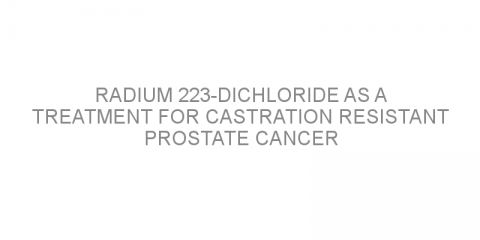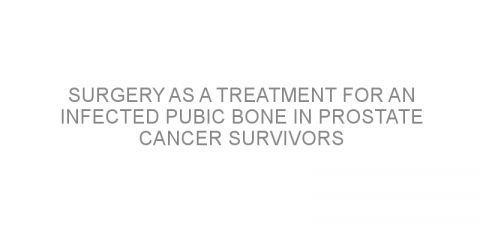In a nutshell This study investigated how effective and safe radium 223 dichloride treatment was in patients with castration resistant prostate cancer (CRPC). It was concluded that radium 223 dichloride increased overall survival, reduced symptomatic skeletal events risk and was safe. Some background Treatment to decrease the male hormones,...
Read MoreTreatment(s) already received-Radical prostatectomy Posts on Medivizor
Looking for overweight or obese prostate cancer patients with disease progression after primary therapy
In a nutshell This phase 2 trial aims to evaluate the benefit of adding metformin (Glucophage) to hormone therapy with bicalutamide (Casodex). The main outcome to be investigated is treatment response. The trial is recruiting in Philadelphia (Pennsylvania), USA. The details Obesity and metabolic syndrome (a collection of conditions including...
Read MoreBlood counts after prostate surgery can predict clinical outcomes
In a nutshell This study examined whether the neutrophil-to-lymphocyte ratio (NLR) before treatment can be used to predict clinical outcomes in localized prostate cancer. Researchers reported poorer outcomes for patients with higher NLR after surgery. Some background Neutrophils are cells that are involved in inflammation (reaction to injury or...
Read MoreCan radiation and hormone therapy after surgery improve prostate cancer survival rates?
In a nutshell The aim of this study was to determine whether radiation therapy in combination with hormonal therapy improved survival in men with prostate cancer that has spread to the lymph nodes after surgery. Researchers concluded that patients treated with radiation therapy and hormone therapy had a significantly higher survival rate compared to...
Read MoreExamining surgery as a primary treatment for high-risk prostate cancer
In a nutshell This study examined evidence for the role of prostate surgery in treating high-risk prostate cancer. Authors concluded that surgery is an effective primary treatment option for men with high-risk disease. Some background Localized prostate cancer is cancer that is confined to the prostate gland. Men with high-risk localized prostate...
Read MoreSurgery as a treatment for an infected pubic bone in prostate cancer survivors
In a nutshell This study examined the effectiveness of pubic bone removal on pain intensity associated with an infected pubic bone in prostate cancer survivors. Authors concluded that surgical treatment is an effective approach in providing long-term pain relief from an infected pubic bone. Some background Surgery and radiation are two first-line...
Read MoreImaging technology can help predict cancer recurrence after surgery
In a nutshell This study examined the imaging technique multiparametric magnetic resonance imaging (mpMRI) as a predictor of disease recurrence after prostate surgery. Researchers concluded that the addition of mpMRI results improves the prediction of disease recurrence after surgery. Some background Prostate surgery is one of the recommended...
Read MoreTwo new predictors of cancer recurrence after surgery: Perineural invasion and lymphovascular invasion
In a nutshell This study examined two new predictors of prostate cancer recurrence – perineural invasion (PNI) and lymphovascular invasion (LVI). Researchers reported increased recurrence risk after prostate surgery if patients show PNI or LVI before surgery, particularly if both were present. Some background Localized (confined)...
Read MoreComparing surgery and radiation therapies for high-risk prostate cancer
In a nutshell This study compared prostate surgery and radiation therapy in treating high-risk prostate cancer. Authors reported similar survival benefits with both treatments. However, high doses of total radiation combined with hormone therapy was associated with the lowest risk of disease progression. Some background Prostate surgery and...
Read MoreExamining the risk of disease recurrence more than 10 years after prostate surgery
In a nutshell This study examined risk factors for prostate cancer recurrence more than 10 years after prostate surgery. Researchers concluded that disease recurrence rates continued to increase between 10 and 20 years after surgery. Age at surgery and increased cancer markers were found to be predictive of late disease recurrence. Some background...
Read MoreTreatment options in prostate cancer patients with biochemical relapse
In a nutshell The authors determined the benefit of docetaxel (Taxotere), bevacizumab (Avastin) and hormone therapy in treating prostate cancer patients with biochemical recurrence. Some background Biochemical recurrence can occur in prostate cancer patients after primary treatment. This means there is an increase in PSA. PSA...
Read MoreDiabetes in prostate cancer patients – negative impact?
In a nutshell The authors determined the effect of diabetes on prostate cancer outcome following prostate surgery. Some background Prostate surgery is a common treatment for prostate cancer. It involves surgically removing the prostate gland. In some cases, additional health issues, such as diabetes, may have a negative impact on...
Read More












